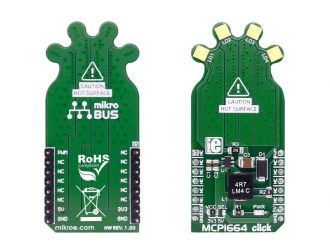
We strongly encourage users to use Package manager for sharing their code on Libstock website, because it boosts your efficiency and leaves the end user with no room for error. [more info]

Rating:
Author: MIKROE
Last Updated: 2019-05-03
Package Version: 1.0.0.1
mikroSDK Library: 1.0.0.0
Category: LED Drivers
Downloaded: 5149 times
Not followed.
License: MIT license
MCP1664 click contains 4 high-power white LEDs. It carries the MCP1664, a high-voltage step-up LED driver from Microchip. MCP1664 click is designed to run on either 3.3V or 5V power supply. It communicates with the target board microcontroller over the PWM pin on the mikroBUS line.
Do you want to subscribe in order to receive notifications regarding "MCP1664 click" changes.
Do you want to unsubscribe in order to stop receiving notifications regarding "MCP1664 click" changes.
Do you want to report abuse regarding "MCP1664 click".

Library Description
The library covers all the necessary functions to control MCP1664 Click board. IR Beacon Click communicates with the target board via PWM module. This library contains drivers for enabling or disabling PWM.
Key functions:
void mcp1664_enablePwm() - Function enables the PWM by seting PWM pin.void mcp1664_disablePwm() - Function disables the PWm by clearing PWM pin.Examples description
The application is composed of the three sections :
void applicationTask( )
{
mcp1664_enablePwm();
for ( dutyCycle = 0; dutyCycle < 8000; dutyCycle += 500 )
{
mcp1664_pwmSetDuty( dutyCycle );
mikrobus_logWrite( " Duty cycle is : ", _LOG_TEXT );
IntToStr( dutyCycle, logTxt );
mikrobus_logWrite( logTxt, _LOG_LINE );
mikrobus_logWrite( "------------------", _LOG_LINE );
Delay_ms( 1000 );
}
Delay_ms( 3000 );
}
Other mikroE Libraries used in the example:
PWMUARTConversionsAdditional notes and informations
Depending on the development board you are using, you may need USB UART click, USB UART 2 click or RS232 click to connect to your PC, for development systems with no UART to USB interface available on the board. The terminal available in all MikroElektronika compilers, or any other terminal application of your choice, can be used to read the message.